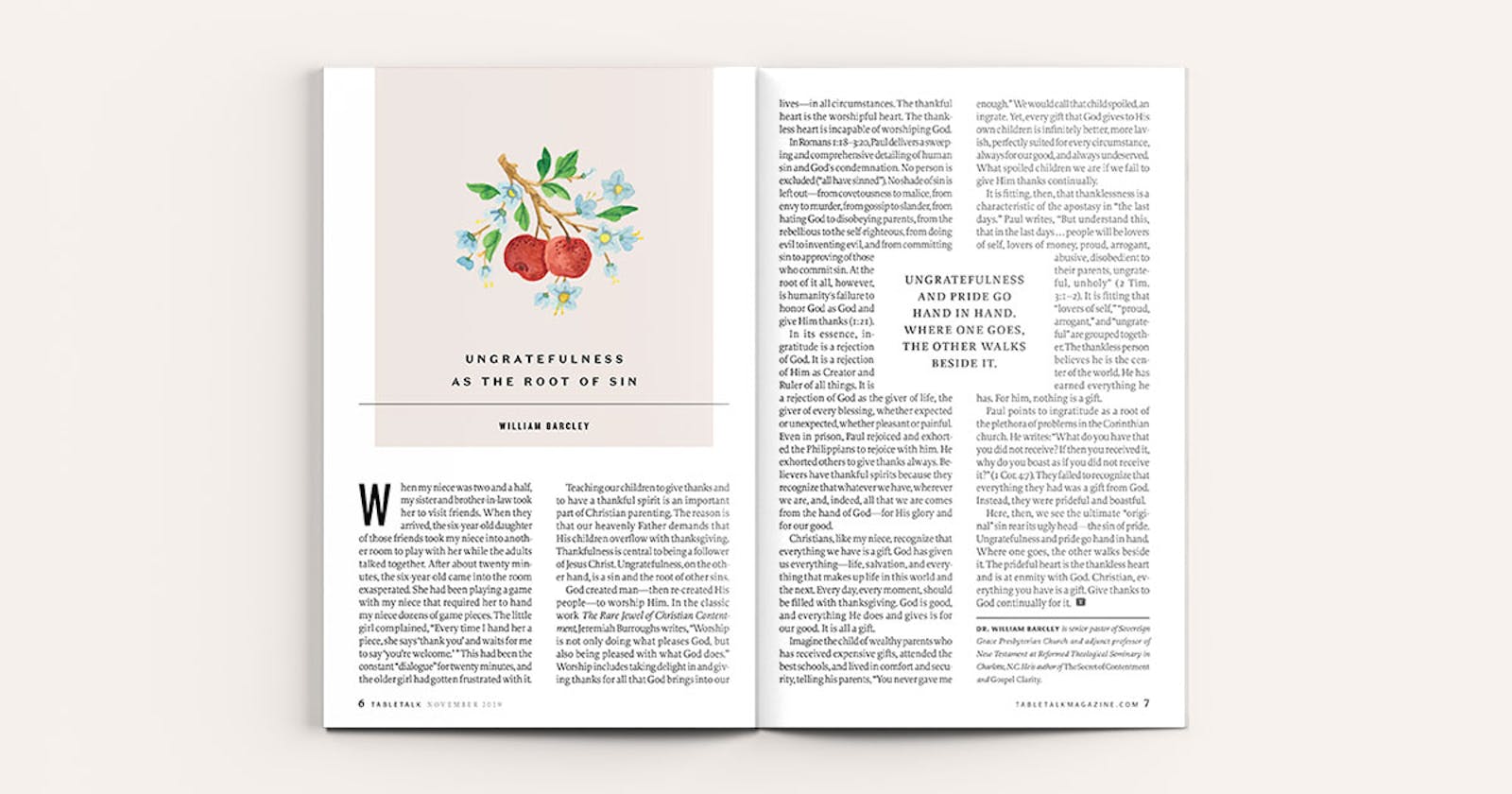
Request your free, three-month trial to Tabletalk magazine. You’ll receive the print issue monthly and gain immediate digital access to decades of archives. This trial is risk-free. No credit card required.
Try Tabletalk NowAlready receive Tabletalk magazine every month?
Verify your email address to gain unlimited access.
When my niece was two and a half, my sister and brother-in-law took her to visit friends. When they arrived, the six-year-old daughter of those friends took my niece into another room to play with her while the adults talked together. After about twenty minutes, the six-year-old came into the room exasperated. She had been playing a game with my niece that required her to hand my niece dozens of game pieces. The little girl complained, “Every time I hand her a piece, she says ‘thank you’ and waits for me to say ‘you’re welcome.’” This had been the constant “dialogue” for twenty minutes, and the older girl had gotten frustrated with it.
Teaching our children to give thanks and to have a thankful spirit is an important part of Christian parenting. The reason is that our heavenly Father demands that His children overflow with thanksgiving. Thankfulness is central to being a follower of Jesus Christ. Ungratefulness, on the other hand, is a sin and the root of other sins.
God created man—then re-created His people—to worship Him. In the classic work The Rare Jewel of Christian Contentment, Jeremiah Burroughs writes, “Worship is not only doing what pleases God, but also being pleased with what God does.” Worship includes taking delight in and giving thanks for all that God brings into our lives—in all circumstances. The thankful heart is the worshipful heart. The thankless heart is incapable of worshiping God.
In Romans 1:18–3:20, Paul delivers a sweeping and comprehensive detailing of human sin and God's condemnation. No person is excluded (“all have sinned”). No shade of sin is left out—from covetousness to malice, from envy to murder, from gossip to slander, from hating God to disobeying parents, from the rebellious to the self-righteous, from doing evil to inventing evil, and from committing sin to approving of those who commit sin. At the root of it all, however, is humanity's failure to honor God as God and give Him thanks (1:21).
In its essence, ingratitude is a rejection of God. It is a rejection of Him as Creator and Ruler of all things. It is a rejection of God as the giver of life, the giver of every blessing, whether expected or unexpected, whether pleasant or painful. Even in prison, Paul rejoiced and exhorted the Philippians to rejoice with him. He exhorted others to give thanks always. Believers have thankful spirits because they recognize that whatever we have, wherever we are, and, indeed, all that we are comes from the hand of God—for His glory and for our good.
Christians, like my niece, recognize that everything we have is a gift. God has given us everything—life, salvation, and everything that makes up life in this world and the next. Every day, every moment, should be filled with thanksgiving. God is good, and everything He does and gives is for our good. It is all a gift.

Imagine the child of wealthy parents who has received expensive gifts, attended the best schools, and lived in comfort and security, telling his parents, “You never gave me enough.” We would call that child spoiled, an ingrate. Yet, every gift that God gives to His own children is infinitely better, more lavish, perfectly suited for every circumstance, always for our good, and always undeserved. What spoiled children we are if we fail to give Him thanks continually.
It is fitting, then, that thanklessness is a characteristic of the apostasy in “the last days.” Paul writes, “But understand this, that in the last days . . . people will be lovers of self, lovers of money, proud, arrogant, abusive, disobedient to their parents, ungrateful, unholy” (2 Tim. 3:1–2). It is fitting that “lovers of self,” “proud, arrogant,” and “ungrateful” are grouped together. The thankless person believes he is the center of the world. He has earned everything he has. For him, nothing is a gift.
Paul points to ingratitude as a root of the plethora of problems in the Corinthian church. He writes: “What do you have that you did not receive? If then you received it, why do you boast as if you did not receive it?” (1 Cor. 4:7). They failed to recognize that everything they had was a gift from God. Instead, they were prideful and boastful.
Here, then, we see the ultimate “original” sin rear its ugly head—the sin of pride. Ungratefulness and pride go hand in hand. Where one goes, the other walks beside it. The prideful heart is the thankless heart and is at enmity with God. Christian, everything you have is a gift. Give thanks to God continually for it.
